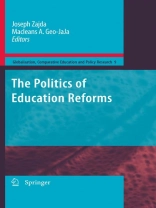The Politics of Education Reforms, which is the ninth volume in the 12-volume book series Globalisation, Comparative Education and Policy Research, presents scholarly research on major discourses concerning the politics of education reforms globally. It provides an easily accessible, practical yet scholarly source of information about recent developments in globalisation, comparative edu- tion and education reforms. Above all, the book offers the latest findings to the critical issues concerning major discourses surrounding education reforms in the global culture. It is a sourcebook of ideas for researchers, practitioners and policy makers in education, and schooling around the world. It offers a timely overview of current policy issues affecting research in comparative education of education reforms. It provides directions in education, and policy research, relevant to p- gressive pedagogy, social change and transformational educational reforms in the twenty-first century. The book critically examines the overall interplay between the state, ideology and current discourses of education reforms in the global culture. It draws upon recent studies in the areas of globalisation, academic achievement, standards, equity and the role of the State (Carnoy 1999; Zajda 2008a, b). It explores c- ceptual frameworks and methodological approaches applicable in the research covering the State, globalisation, and quality-driven education reforms. It dem- strates the neo-liberal ideological imperatives of education and policy reform, affecting schooling globally (see also Zajda 2005). Various book chapters critique the dominant discourses and debates pertaining to comparative education d- courses on reforms and neo-liberal ideology in education.
Jadual kandungan
MAIN TRENDS AND ISSUES.- Neoliberalism, the New Imperialism, and the “Disappearing” Nation-State: A Case Study.- How Educational Systems Form and Reform.- Academic Capitalism in Japan: National University Incorporation and Special Zones for Structural Reform.- Globalisation and Higher Education Policy Changes.- The Emergence of the Local Management of Schools (LMS) in Israel: A Political Perspective.- Alternative Approaches on Society, State, Educational Reform, and Educational Policy.- EQUALITY, ACCESS AND DEMOCRACY.- Social Exclusion, Poverty, and Educational Inequity in the Niger Delta Region of Nigeria: Which Development Framework.- Constructing Worker-Citizens in/Through Teacher Education in Cuba: Curricular Goals in the Changing Political Economic Context.- The Reform of Chinese College English Teaching (CCET) in the Context of Globalisation.- Global Teacher Rec ruitment as a Challenge to the Goal of Universal Primary Education.- Power and Authority in School and Community: Interactions Between Non-Indigenous Teachers and Indigenous Teacher Assistants in Remote Australian Schools.- Deliberative Pedagogy and the Rationalization of Learning.












